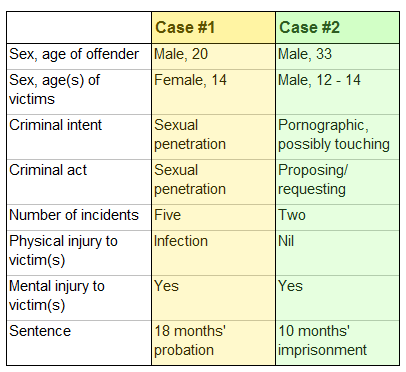It is incontrovertible that when someone has done wrong against another, justice requires that the former pay a penalty. Less noticed are other aspects: that to be just requires that the penalty must be proportionate to the degree of wrongdoing, and that if two persons commit similar crimes, the penalties imposed on them should be comparable.
The latter two aspects may be harder to uphold than the first prescription. Proportionality requires dispassion, but humans are prone to moral panics. When there’s a spate of house burglaries (even if it is not a real increase in incidents, but merely an increase in newspaper headlines) we start demanding severe punishment for it whereas in quieter times, we’re quite easy with lighter sentences.
Comparability in sentencing requires us to park aside our prejudices. And this is even harder to do because most people do not admit to holding prejudices. However, all it takes are open eyes: Look at how shabbily Indian shoppers are often treated in shops compared to the fawning that greets Western Caucasian shoppers. But the truth is, most of us do not wish to open our eyes. Lawyers and judges have been known to fail to park their own prejudices.
Justice SHOULD be blind, but it is very easy to fall short.
* * * * *
Today’s Straits Times carried two stories from the courts.
The first was about a 20-year-old guy who had sex five times with a 14-year-old girl.
A full-time national serviceman who probably infected an underage girl with a sexually transmitted disease was yesterday ordered to be put on 18 months’ probation.
The 20-year-old admitted to two out of five charges of having sex with the girl, then 14, in October 2009.
Neither of them can be named.
The court heard that he had got her contact number through a mutual friend in October 2009, and started sending her text messages.
He asked the girl, who told him she was a virgin, to be his girlfriend, and she agreed. Two days later, at his home in Jurong, they had sex; about a month later, they had sex again at his home.
On Dec 30 that year, she went to a polyclinic complaining of pain while urinating, but left without having the prescribed urine and pregnancy tests carried out. She told the doctor that she had not had sex with anyone else.
The next month, she was examined by a doctor in hospital and was found to have chlamydia, which the accused was also found to have.
— Straits Times, 22 Feb 2011, NSF gets 18 months’ probation for underage sex
The second report was about another man who made sexual approaches to two boys who were probably between 12 – 14 years old, estimated from the fact that they were in Secondary 1 and 2:
The High Court yesterday upheld the 10-month jail term meted out to a former primary school teacher who tried to persuade two teenage boys to masturbate and let him watch.
In dismissing an appeal by Chock Soon Seng , 33, against the jail term handed down by a lower court last December, Justice Tay Yong Kwang said the sentence was not manifestly excessive. Chock had been convicted of two counts of attempted sexual exploitation of a child.
In 2008, he told one victim, a Secondary 2 student he met online, to film himself in a toilet using his mobile phone. But the boy lied that the video function was faulty.
The teacher later sent a series of text messages to a Secondary 1 student, including one asking the boy to join him to watch pornography and masturbate.
After finding out about the lewd texts in May 2009, the boy’s mother told her son’s school discipline master, who happened to be a police volunteer. He called Chock to arrange a meeting at a neighbourhood police post that evening.
When confronted, the teacher admitted sending the lewd messages.
Yesterday, Chock’s lawyer, Mr Anthony Lim, arguing for a shorter jail term, said his client was genuinely remorseful.
Mr Lim noted that when the complaint was made, the teacher gave himself up, confessed, apologised to the boys and their parents, and quit his job. He also said the district judge put too much emphasis on his client being a teacher, as the victims were not his students, meaning there was no abuse of trust.
Mr Lim also argued that there was no physical contact with the boys.
But Deputy Public Prosecutor Kan Shuk Weng said that even though the victims were not Chock’s students, he had a duty to instil moral values in them.
She said it was not that Chock did not want physical contact, but that the boys had the ‘good sense’ not to meet him.
— Straits Times, 22 Feb 2011, Lewd proposals: Jail term upheld for ex-teacher
Both sex-related cases with victims who were underage, but there are differences. Let’s compare the two cases:
The most significant difference, in my opinion, that relate to the gravity of the offences is this: Case #1 intended and resulted in penetrative contact which in turn resulted in physical injury.
As for mitigating factors, the perpetrator in Case #1 was himself not yet 21. Generally, the law is less harsh on those below 21 and rightly so.
As for whether the youngsters consented, it is an immaterial consideration. The girl seemed to have consented, but not the two boys. However it is immaterial because the law does not consider persons of that age capable of making informed consent.
There are two questions here:
1. Do you consider the two sentences equitable between these two offenders? If not, which do you consider too harsh or too light?
2. Even if you consider both sentences roughly comparable given the circumstances, do you consider both sentences too harsh, too light, or just right?
And why?




Hi Alex,
The cases are different:
There is the age question 12-14 asumption is not the same as 14
And there is the abuse of position of confidence/power
Case #2 is a teacher.
The consent of the minor is irrelevant is determining the guilt of the accused, but then it is a relevant factor during sentencing. Thus, both were held guilty, but then in Case #1, there is consent by the girl (although such consent is not legally-valid), but in Case #2, there is no consent. So there is a somewhat legal-basis for a difference in sentencing, but I totally agree with you, that is cannot justify such a huge difference in sentencing – one is only on probation, the other get sent to jail.
But then, it is almost needless to say that Singaporean courts and govt are biased against any homosexual behaviour.
The sentence meted out in Case #2 seems too harsh. I agree with the defence attorney that too much emphasis was placed on the fact that the accused was a teacher. From the report, it appears that he did not prey on his own students but instead sought out his victims online, so his day job should be irrelevant.
Teachers should no doubt be treated more harshly if they abuse their position of trust, but apart from that, they should be treated equally in all other areas of life. The DPP’s argument that the accused had a “duty to instil moral values” in his victims is complete bollocks. Does a lawyer have a duty to give legal advice to everyone he meets? Does a doctor have a duty to diagnose diseases while attending a social function?
I can understand that while both cases seemed similar, but the underlying problems is rather different.
In Case A, its simply a boy-girl relationship issue. Singapore did report that underaged sex is on the rise and alot of youths are engaging in sexual behaviour at a much younger age.
I’m not saying that it is the norm but its simply a case of the NSF’ bad luck that he was too promiscious without protection and the whole affair blew up due to the STDs.
In Case B, ts was a case of the teacher abusing the trust that the government, school, parents and the students had invested in him. It was a slap to the government face as they “have gone through serious character investigation” prior to accepting the guy as a teacher. Hence the heavier punishment
Alex,
A digression.
I have noted for some time now that the local laws have an inherent tendency not to protect females adequately, as in this case of the sexual offence perpetuated by the NSman.
Another example – the case of the boyfriend/husband who physically assaulted a woman badly on at least four separate occasions but his sentence did not include caning (making a point, not that I support caning). Compare this to another case where no physical assault took place, but the offender was actually sentnced to be caned!
This disparity is also obvious in your examples, in which the BOYS got protected much more than the female victims! Typical Chinese bias that males are more important than females!?
You still don’t get it, do you?
One is homo, one is hetero.
Of course he gets it. That’s the very reason why this piece was written. It was to make sure that you get it as well.
I do not think that the bias comes from the fact that one is homo and the other is heter. It all voices down to this.
Case # 1: BGR. Curious. Some innocent involved. Accused is young too and should be given a lighter sentence.
Case # 2: Predator. Hunt. Initial Action. Encouragement. Harresment. Worst. As teacher and much older, he should kn better. And if the boys do meet, do you think the teacher will only just watch and touch? Surely, enough cases on the news will tell you that there may be oral/Annal sex involve eventually.
Actually I agree with javinchew@yahoo.com. I think the sentence is due to the preying.
I think a better comparison would be if both were consensual. If anyone can find a case where the boys were underaged and consented, then compare that sentence to case #1, that would be better.
You’re only calling the 1st case a boy girl relationship because the young girl consented. If she had not, the NSF’s action and motives would be the same as the 33 year old’s. The NSF did search her out and started sending text messages, no different than the 2nd case. Both motives are similar. Can’t you see your own prejudice in trying to make a distinction when there is none?
sorry to step off topic briefly, but really alex?
“Look at how shabbily Indian shoppers are often treated in shops compared to the fawning that greets Western Caucasian shoppers.”
i must say i’ve yet to receive any fawning of any nature in any shop here – it’s just the nature of the terrible service culture. you could have picked a better example, like chinese landlords refusing to rent to indian and tenants – a situation i’ve heard of happening many times.
anyway, here’s hoping you don’t get slapped with a contempt charge 😉
Since when should people be punished according to their occupations unless of course there had been an abuse of power? From what i read, there was nothing to suggest that Chock Soon Seng abused his power by coercing his students to perform lewd acts on him.
1st offender is below 21, but still sentence is too light.
2nd offender sentence is too much, considering that there is no force, threat, or any intent of physical harm.